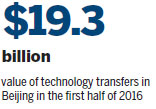

Self-driving vehicles, smart robots and liquid metal... Nearly 200 technological achievements are being showcased at an exhibition in Beijing during the 2016 National Mass Innovation and Entrepreneurship Week from Oct 12 through 18.
The projects include a wide range of sectors such as artificial intelligence, new materials, environmental protection and biotechnology, with 70 percent of them launched within the past five years.
A facial recognition system developed by SenseTime, the first in the world that is more accurate than human eyes, is one of the most attractive projects at the event.
Another star is a colloidal quantum dot spectrometer. Used in almost every research sector for scientific analysis, traditional spectrometers are too big to move. Thanks to innovations in materials and technology, the showcased device is the size of a cellphone, nearly a thousandth of the size of traditional equipment and a thousandth of the cost.

"Mass innovation and entrepreneurship is progressing robustly across China, with improved policies, stronger platforms, increasing investment and a growing number of startups and entrepreneurs," said Wang Xiaotao, vice-minister of the National Development and Reform Commission, at the opening ceremony of the event.
He called on Beijing to build a national technological and innovation center and facilitate free flow of innovation and entrepreneurship elements throughout the Beijing-Tianjin-Hebei region.
Beijing Mayor Wang Anshun said the local government has been actively improving its policies to cultivate an innovation-friendly environment in recent years.
As one of the most active bases for innovation in China, Beijing boasts more than 90 universities, 280 research institutions and many of the nation's leading high-tech companies.
Beijing's research and development expenditure makes up 5.95 percent of its annual GDP, and there are 61.3 invention patents for each 10,000 residents in the city, both numbers leading the nation.
In the first half of this year, contracts for technology transfer totaled more than 130 billion yuan ($19.3 billion), up 6 percent from the same period last year.
Beijing officials said there are "beneficial interactions" among the local government, innovators and the public, thanks to the introduction of top talent and high-end industries, market orientation and improved government services.
Many leading innovative companies in Beijing have expanded to neighboring Tianjin and Hebei province.
Jing-Jin Electric, developer of the world's most powerful motor for electric cars, has planned a facility in Shijiazhuang in Hebei, designed for an annual capacity of 500,000 motors and powertrains, which will become the largest of its kind nationwide when completed.
zhangzhao@chinadaily.com.cn
|
Visitors at the Beijing event of the 2016 National Mass Innovation and Entrepreneurship Week interact with a smart robot. |